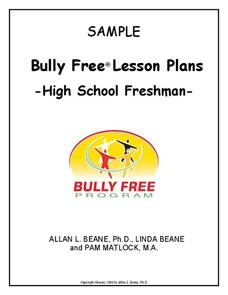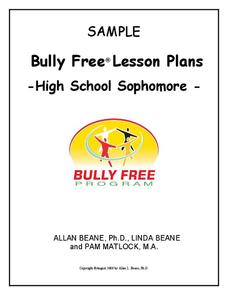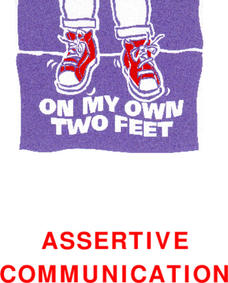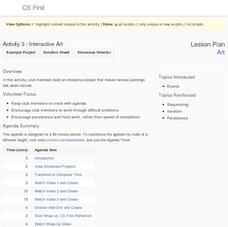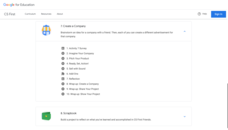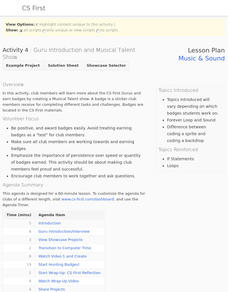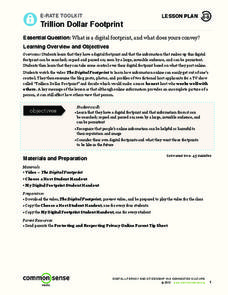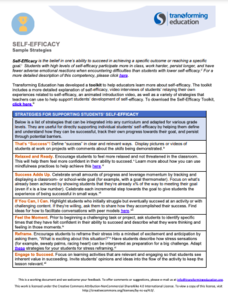Bully Free Systems
Bully Free Lesson Plans—Ninth Grade
"Bullying and Prejudice" and "Do You Cyber Bully," two lessons from a complete Bully Free program, serve as samples of the approach used in a unit designed to bring awareness to and to combat bullying. Each lesson asks class...
Bully Free Systems
Bully Free Lesson Plans—10th Grade
Two lessons, "What Does Cyber Bullying Look Like?" and "Factors Influencing My Reporting the Bullying of Others," serve as examples of the 12 included in a Bully Free curriculum. Each plan includes discussion questions, an activity,...
Bully Free Systems
Bully Free Lesson Plans—11th Grade
It takes courage to stand up to bullies. Two sample lessons from a complete Bully Free curriculum, "Courageous and Brave Bystanders" and "Assertiveness Skills for Bullied Students and Empowered Bystanders" provide participants with...
Bully Free Systems
Bully Free Lesson Plans—12th Grade
Two sample lessons from a curriculum unit on bullying provide high school seniors with an opportunity to assess their online and cell phone behavior and to consider how they can offer support to bullied students. Each plan includes an...
Community High School of Vermont
Habits of Mind
Here is a comprehensive unit on the 16 Habits of Mind that includes a wide variety of activities, worksheets, differentiation strategies, and instructor notes. The unit consists of 18 lessons and offers an organized progression of...
K20 LEARN
Conflict And Choice In Tangerine: Character Development
Introduce middle schoolers to Edward Bloor's novel Tangerine with a lesson plan that asks scholars to make predictions about events in the novel based on an article written by the Smoop Editorial team. Predictions are posted in the...
Department of Education (Ireland)
Assertive Communication
Assertive communication is an acquired skill. Teaching young people to ask for what they need and to believe that they have a right to ask is at the core of a unit on assertive communication. Over the course of the unit, middle and high...
Virginia Middle School Engineering Education Initiative
Save the Penguins: An Introduction to Thermodynamics and Heat Transfer
Heat things up in your physical science class with this interactive lesson series on thermodynamics. Through a series of class demonstrations and experiments, young scientists learn how heat is transferred through conduction,...
Google
Art: Interactive Art
What would the Mona Lisa say if she could talk? Scholars create a digital story within the Scratch block-based coding program. They make famous paintings talk and move when viewers click on them to complete the third of eight parts in...
Teach Engineering
Storing Android Accelerometer Data: App Design
There's an app for that! Pupils learn to build an app that will store data on an Android. The instructional activity introduces class members to the tiny database, TinyDB, for Android devices. A video tutorial provides an...
Howard Hughes Medical Institute
The Making of the Fittest: Got Lactase? The Co-evolution of Genes and Culture
Got milk? Only two cultures have had it long enough to develop the tolerance of lactose as an adult. Learn how the responsible genes evolved along with the cultures that have been consuming milk. This rich film is supplied with a few...
Facing History and Ourselves
Hands Up, Don't Shoot!
Why is it so difficult to develop a clear understanding of the events surrounding the shooting of Michael Brown by a Ferguson, Missouri, police officer? To answer this question class members listen to a NPR discussion of the findings of...
College Board
Try This! Calculus Teaching Tips
It's important to spice up your lessons. An online article discusses teaching strategies for AP® Calculus. In-class activities include matching games, placemats, multiple choice questions, scripted discussion, involuntary discussion,...
Google
Friends: Create a Company
Create a company, advertise it, and hope it grows. The seventh of eight parts in the Google CS First Friends unit challenges future business leaders to apply computer coding to create an advertisement for a company. After pairs come...
PBS
Reading Adventure Pack: Cooking
A Reading Adventure Pack focuses on cooking. Scholars participate in three hands-on activities after reading the fiction book Easy as Pie by Cari Best and the nonfiction book How Did That Get in My Lunchbox? by Chris Butterworth....
Google
Music and Sound: Guru Introduction and Musical Talent Show
Become talented in computer science. After interviewing a computer science guru, pupils work on individual projects related to a virtual music talent show. They learn how to use different code blocks in the Scratch programming language,...
Historical Thinking Matters
Scopes Trial: 1 Day Lesson
Why did many Tennesseeans support the 1925 Butler Act, which forbade the teaching of evolution? Using several primary source documents and a brief video clip, your young historians will draw connections between the broader historical...
Howard Hughes Medical Institute
The Making of the Fittest: Evolving Switches, Evolving Bodies
How did the stickleback fish, which was once ocean bound, evolve to be able to persist in freshwater lakes? Hear from the scientists who identified the genes and related switches that allowed these survivors to adapt. In addition to the...
Transforming Education
Self-Efficacy Toolkit
A PowerPoint presentation prepares instructors for teaching learners about self-efficacy, a key competency of social-emotional learning. The 29-page presentation is designed to give administrators and teachers a deeper understanding of...
Common Sense Media
Trillion Dollar Footprint
Learners explore their digital footprints, and discover how information they put online can easily be searched, copied, forwarded, and seen by a large audience.
Curated OER
Radiation Comparison Before and After 9-11
Using the NASA website, class members try to determine if changes could be detected in cloud cover, temperature, and/or radiation measurements due to the lack of contrails that resulted from the halt in air traffic after the attacks...
Transforming Education
Self-Efficacy Strategies
Scholars with high levels of self-efficacy perform better in school. Instructors review a list of strategies for enhancing self-efficacy skills. They discover how to teach learners to appropriately define success, celebrate progress, and...
New Jersey Historical Commission and New Jersey Council for the Humanities
Thomas Edison: The Wizard of Menlo Park
What would change in your daily life due to a power outage? Here, learners explore the inventions brought to us by the one and only, Thomas Edison, and imagine a day without them. Scholars take part in a grand conversation and write a...
Google
Art: Greeting Card
Greetings from your computer science class! The culminating activity in the eight-part Google CS Art unit has scholars create digital cards. The purpose of the cards is to show their families what they now know about programming.
